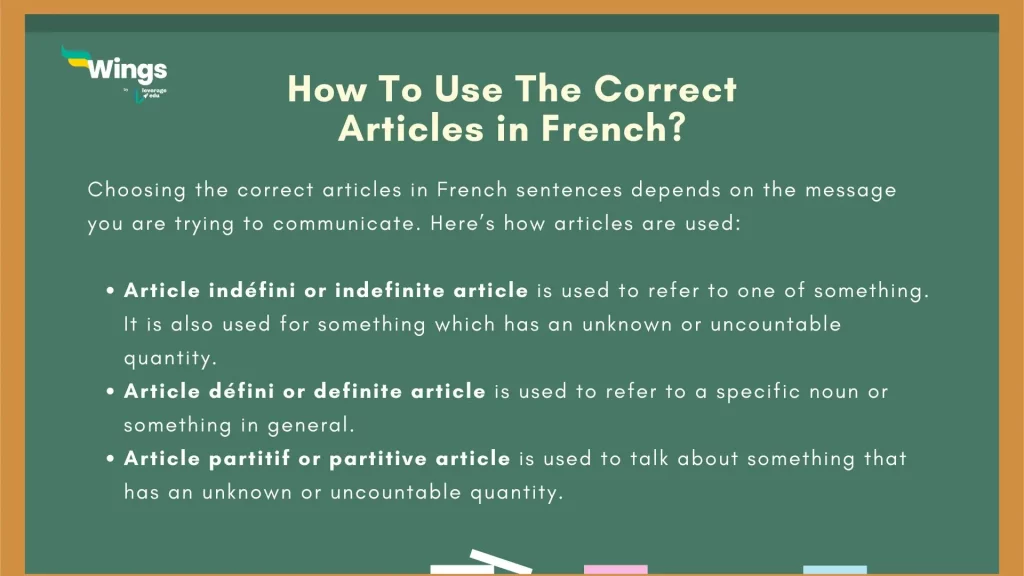“Le chat est noir” (The cat is black), “Je lis un livre (I read a book)”. Do you notice the highlighted articles in French in these sentences? Articles are the key elements placed before nouns to indicate number and gender in French, leading to a different writing style than English. French articles define nouns and offer clarity, playing a key role in constructing sentences, specifying and adding nuance to them. They help distinguish general and specific references and their absence can significantly change the meaning of a sentence. So knowing how to use articles in Francais correctly is crucial. Let’s get started without any further ado. Ready, set, lingo!
This Blog Includes:
Also Read: 70 Basic French Language Words You Need to Know Before Getting Started
Types of Articles in French
Articles in French are needed in almost every common noun, much more so than in the English language. There are 3 types of articles in French and they all agree in gender and number with the nouns they modify. Let’s learn about them in detail below.
Indefinite Articles
Indefinite articles (or articles indéfinis) refer to an unspecific noun or the amount of something. They are also used to refer to a single unit of something. There are 3 indefinite articles in French and their use depends on the gender of the noun and the quantity, as shown below:
| Gender | Article | Meaning |
| Masculine | un | a/an/one |
| Feminine | une | a/an/one |
| Masculine and Feminine Plural | des | some |
Examples: une amie (a friend (female)), un livre (a book), and des fruits (some fruits)
Definite Articles
Definite articles (or articles définis) are used for referring to a specific noun or class of nouns. There are four definite articles in French and their use depends on the quantity, gender, and first letter of the following noun.
| Article | Gender | Meaning |
| le | masculine | the |
| la | feminine | the |
| les | masculine/feminine plural | the/these |
| l’ | noun starts with vowel/h muet | the |
For example: le livre (the book), l’orange (the orange), and la maison (the house)
Partitive Articles
Partitive articles (or articles partitifs) refer to a part or a portion of an uncountable noun. There are 4 partitive articles in French which depend on the quantity, gender, and first letter of the following noun.
| Article | Gender | Meaning |
| du | masculine | some/any |
| de la | feminine | some/any |
| des | masculine/feminine plural | some/any |
| de l’ | noun starts with vowel/h muet | some/any |
For example: de la farine (some flour), des raisins (some grapes), du lait (some milk), and de l’eau (some water)
You can also refer to this tutorial on French articles for clarity on the subject:
How To Use The Correct Articles in French?
Choosing the correct articles in French sentences depends on the message you are trying to communicate. Here’s how articles are used:
- Article indéfini or indefinite article is used to refer to one of something. It is also used for something which has an unknown or uncountable quantity.
- Article défini or definite article is used to refer to a specific noun or something in general.
- Article partitif or partitive article is used to talk about something that has an unknown or uncountable quantity.

Also Read: How to Learn French Quickly? Here are 10 tips to Master the Language!
Relevant Reads:
| List of French Adverbs with English Translation | Top 10 Free French Lessons for Beginners with Certificates |
| French Education System: A Complete Guide for International Guide | What are French Prepositions: Meaning, Exercises With Answers |
| Your Guide to Best Online French Courses with Certificates | DELF Exam: French Proficiency Tests |
FAQs
Answer: The three articles in French, namely Indefinite, Definite, and Partitive.
Answer: Un is used for masculine singular nouns, and une is used for feminine singular nouns.
Answer: It is because pizza is feminine in French.
And we are done with the articles in French for today. Tune into Leverage Edu’s study abroad resources for more informative blogs on French like this. Happy Learning!


 One app for all your study abroad needs
One app for all your study abroad needs












 60,000+ students trusted us with their dreams. Take the first step today!
60,000+ students trusted us with their dreams. Take the first step today!